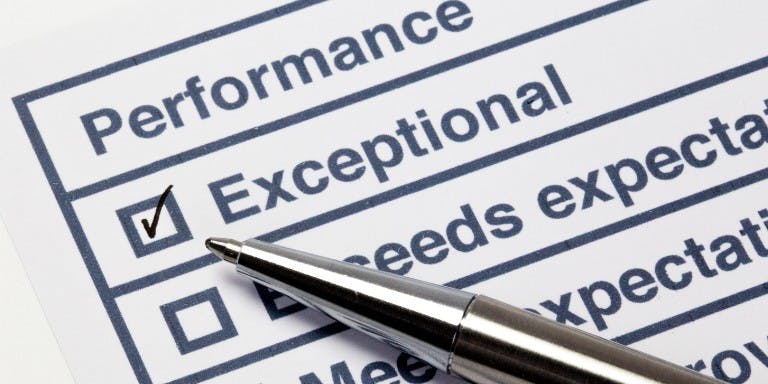First published on Thursday, February 2, 2023
Last updated on Friday, December 13, 2024
Jump to section
- What is an Underperforming Employee?
- How do I Identify Underperforming Employees?
- What Causes Underperformance?
- How to Talk to an Underperforming Employee
- Terminating an Underperforming Employee
- Tips on How to Deal with an Employee Who is Underperforming
- Get Advice on Underperforming Employees with BrightHR
Employees are a key cog in any business. So when an employee is underperforming, this can cause problems in your workforce and overall operations.
As an employer, it is your duty to address underperforming employees. You should be aware of the common causes and corrective measures you can take to fix this problem.
In this guide, we’ll explain what underperforming employees are, common causes of underperformance, and tips on how to address it.
What is an Underperforming Employee?
An underperforming employee is typically a member of your workforce that produces below standard work over a period of time. When an employee is underperforming, they are not usually meeting work expectations which may affect other employees or your business operations.
It is important that you address underperforming employees as soon as practicable to avoid loss in business.
Underperforming employees can have a serious impact on teamwork and collaborative efforts. This can lower workplace morale and create a poor workplace culture, especially if you are complacent about dealing with them.
How do I Identify Underperforming Employees?
If you are unsure if your employees are underperforming or not meeting work expectations, you should be aware of the indicators. Some examples of underperforming employees include:
Missing deadlines.
Submitting below standard work.
Making and repeating mistakes.
Coming late to work (absenteeism).
Failing to comply with company policies or procedures.
Disrupting conduct.
What Causes Underperformance?
There are various reasons that cause employees to underperform. Here are a few reasons that may cause underperformance.
Stressful work environment: A work environment that is extremely stressful and lacks support may impact work performance.
Lack of skills: An employee who is placed into a work environment without any preparation may not feel confident to do the work. Especially in situations when they are assigned tasks that they do not have the skill or knowledge for.
Poor onboarding: Employees who are not properly onboarded may not have a clear understanding of their responsibilities and the work they are supposed to complete.
Inadequate training: It is important to properly train employees to develop the skills they need to do the job. You should continuously provide training for employees looking to develop new skills to help advance their career within your company.
Personal matters: Often, deeply personal matters may affect an employee’s performance and productivity at work. As an employer, you can be supportive in times of crisis, but it is important to remember to remain objective.
How to Talk to an Underperforming Employee
You or your managers should speak to underperforming employees and find the root cause of the decreased productivity. Speaking to struggling employees may lead to discovering resolutions to return productivity to an acceptable level.
When speaking to an underperforming employee, it is all about timing and knowing how certain employees communicate. It may be appropriate to pull an employee into your office in the middle of the day but may not be for others.
You may need to schedule a meeting or speak to them early in the morning. It is important to create and maintain a good working relationship with all your employees, especially ones who you observe to be underperforming.
Nobody wants to address underperforming employees, but it is something that you need to do. When speaking to employees about performance, you should focus on how you can help resolve the issue rather than punishing them. Tackling underperformance is a team effort, meaning both you and the employee have an important role to play.
Terminating an Underperforming Employee
Every employer should be cautious about terminating an employee for underperformance. Firing an underperforming employee without following the correct procedure may lead to legal repercussions. This could be lawsuits for wrongful termination and in some cases, discrimination claims.
Although it should be the goal to work collaboratively with the employee to resolve their performance issues, you must take the proper corrective and/or disciplinary action.
The most common form of disciplinary action for underperforming employees is progressive discipline. This can be best described as a system of discipline where the penalties increase upon repeat occurrences. Additionally, many employers use performance improvement plans, also referred to as PIPs. A PIP can improve an employee’s performance by monitoring, training, and establishing attainable goals.
Before taking any disciplinary action or implementing a PIP, you should have documents that evidence the employee’s poor performance to support your decision.
Tips on How to Deal with an Employee Who is Underperforming
As an employer, it is your duty to address underperforming employees in your workplace. Here are a few tips to help you address underperformance:
Recognize it: You or your managers should regularly monitor employee performance and be aware of identifiers to address the problem as soon as possible.
Meet with the employee: Whether it be a formal or informal meeting, you should meet with the employee to discuss the underperformance. You should talk about the roles and responsibilities they have and whether the underperformance is related to the employee struggling with workload management.
Determine the problem: Before managing underperforming employees, it is important that you determine the problem first. What is causing the problem? Underperformance may be caused by a multitude of factors, and it is especially important if the problem is related to a protected ground under human rights legislation.
Develop an action plan: Once you and the employee have discovered the causes of underperformance, you and the employee should develop an action plan to resolve it. Resolving it can range from support from other colleagues or further training to refine the skills to do the job.
Retain documents: As an employer, it is important to retain all documents including any performance review for an underperforming employee, or PIPs throughout the process. You should maintain such documents in the employee’s file.
Get Advice on Underperforming Employees with BrightHR
Dealing with underperforming employees is often time consuming. However, most employees embrace a collaborative effort that helps them succeed and develop the skills needed to complete the job.
As an employer, you should understand what causes underperformance and come up with an action plans to address it.
If you need assistance with underperforming employees in your workplace, our BrightAdvice service allows you to receive quality advice on any employment issues you may have.
Contact us on 18882204924 or book a demo today.










